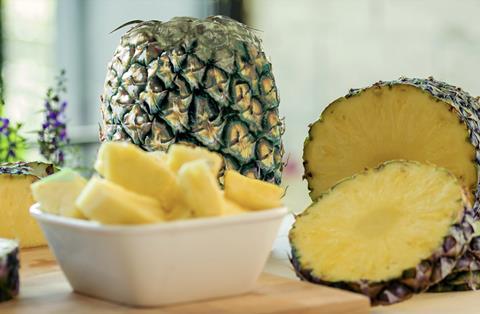More than 80 per cent of consumers fail to store pineapples correctly, eating them later than is optimal, the group finds
New research from tropical fruit specialist Fyffes has found that more than eight in ten consumers (81 per cent) have admitted that they don’t know the correct way to store pineapples, inadvertently eating them later than ideal.

Only 19 per cent of those surveyed knew that the best way to store a pineapple was to chop it up and put it in the fridge, with almost a third (31 per cent) leaving a pineapple to ripen in a fruit bowl.
The survey, that assessed the consumption habits, awareness, and knowledge surrounding pineapples among over 1,000 UK and Ireland consumers, coincided with the launch of Fyffes new crownless pineapples in Europe.
Sustainability benefits
Fyffes said that the launch of its crownless pineapples on the European market presented further sustainability benefits for retailers and consumers.
It confirmed it was ”firmly committed” to responsible production, as illustrated by its greenhouse gas target, endorsed by the Science Based Target initiative and its work on human rights due diligence.
”For retailers, crownless pineapples present the opportunity for reducing carbon emissions significantly as more than 30 per cent more crownless pineapples can be transported as they take up significantly less space,” Fyffes stated.
“The removed crowns are replanted in the pineapple fields or shredded and given to local farmers to be used for animal feed.
”For consumers, crownless pineapples minimise organic waste and reduce time and effort involved in preparation,” it noted.
While many consumers primarily associated Fyffes with bananas, the company is also a major global supplier of pineapples, melons, and other exotic fruits, the company pointed out.
Research results
Research indicated a lack of awareness about pineapples in general, with almost two in five (39 per cent) respondents unaware of the health benefits of the fruit.
The survey also pointed to an increase in the sustainability-conscious consumer, Fyffes revealed, with over two in five (43 per cent) respondents considering it important that the pineapples they purchased were sustainably and ethically sourced.
Some 64 per cent of respondents said that they would be willing to pay more for sustainably and ethically produced pineapples.
One-third of consumers (33 per cent) would be willing to pay 5 per cent more and 22 per cent were willing to pay 10 per cent more.
“We’re pleased to see retailer uptake of crownless pineapples here in the UK,” said John Hopkins, managing director at Fyffes UK. ”The crownless pineapples mean we can help retailers meet their greenhouse gas reduction targets and reduce compostable waste.
”An unexpected benefit is the reaction from consumers who value the space saving in the shopping basket and storage at home,” he outlined. ”We hope to see pineapples become a staple in households across Europe and beyond.”
Important factors
Further findings from the research include the fact that over half (54 per cent) of respondents had increased their fruit consumption in the last six months; freshness (32 per cent), price (17 per cent), and ripeness (17 per cent) were the most important factors for consumers when purchasing pineapples; and 79 per cent of consumers were satisfied with the quality of pineapples available in their local shops.
“We are pleased and encouraged to see the growing demand and importance of sustainability among consumers, with 64 per cent willing to pay more for ethically sourced produce,” said Ciarán Sweeney, managing director at Fyffes Ireland.
”At Fyffes, we have been delivering on our sustainability targets since we set our baseline in 2020, and we are keen to support retailers to meet this growing demand while reducing waste and carbon emissions through innovations like the launch of our new crownless pineapple.”



